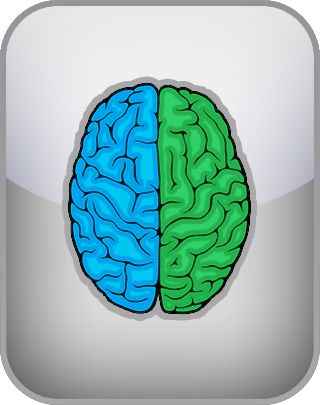Academically reviewed by Dr. Jennifer Schulz, Ph.D., associate professor of psychology
Left-Brained/Right-Brained Test
Based on the work of Dr. Loren D. Crane, Ph.D.
The left brain/right brain theory suggests that different types of thinking are controlled by one side of the brain or the other. The concept of brain function lateralization originated with the work of the American neuropsychologist Roger Sperry, but today the scientific community no longer considers the theory of hemisphere dominance to be tenable. However, the idea that some people are left-brained while others are right-brained lives on as an artifact of popular culture.
This test will categorize you as left-brained or right-brained according to the original theory. To take the test, indicate your answers to each of the following questions below.
Question 1 of 26
I am imaginative and often find myself vividly visualizing situations that are being described to me.
| Disagree | Agree |
NEXT
IDRlabs developed the Left Brain/Right Brain Test (IDR-LB/RB-T), which is based on the paper of Dr. Loren D. Crane, who created the Alert Scale of Cognitive Style, a 20-item assessment tool. The IDR-LBRBT is not connected with any specific researchers in the field of psychology or any associated research institutions.
The Alert Scale of Cognitive Style criteria for brain hemisphere activity informed the IDR-LB/RB-T, as published in Lawrence, A. (2015). Gender-wise analysis on brain dominance and leadership style of the high school teachers. International Journal of Scientific Research. 4. 123-124. Suresh, V., Poornima, C., Anjana, K., & Debata, I. (2020). Assessment of brain dominance and its correlation with academic achievement among medical students: A cross-sectional study. Archives of Mental Health, 21 (1), pp. 25-29.
As noted, the left-brained/right-brained dichotomy no longer enjoys mainstream scientific support. Free online quizzes and tests like the IDR-LB/RB-T are merely initial assessments and cannot yield highly accurate measures of your cognitive style. Therefore, this test is only meant for educational or entertainment purposes. A conclusive psychological assessment can only be made by a qualified mental health professional.
The test provides feedback such as the following: Left-brained people are usually adept at activities that involve critical thinking, numbers, and analytical reasoning. They usually excel in mathematics, science, history, and working with computers. They tend to be methodical and analytical in processing information, and they usually relate more to facts and logic than to images or emotions. Left-brained people prefer consistency over spontaneity and are likely to thrive in structured environments. They prefer their information to be linear, reality-based, and properly sequenced. Right-brained people tend to be adept at activities that involve arts, intuition, imagination, creativity, and expression of emotions. They usually excel at design, music, fiction, drama, and the rest of the arts. Right-brained people tend to be spontaneous, intuitive, and emotion-oriented. They prefer open-ended and imaginative pursuits where there is often more than one correct answer, just as they tend to look for similarities and patterns in everything they do. For this reason, right-brained people are likely to thrive in environments that leave room for spontaneity and afford them the freedom to change course as new inspirations present themselves.
We, the publishers of this free online Left Brain/Right Brain Test, have strived to remain true to the theory of brain hemispheres as indicating variances in cognitive styles. Still, this free, self-report online quiz does not provide expert evaluations or recommendations of any kind; the IDR-LB/RB-T is provided entirely “as-is.” For more information about any of our online tests and quizzes, please consult our Terms of Service.
References
- Lawrence, A. (2015). Gender-wise analysis on brain dominance and leadership style of the high school teachers. International Journal of Scientific Research. 4. 123-124.
- Suresh, V., Poornima, C., Anjana, K., & Debata, I. (2020). Assessment of brain dominance and its correlation with academic achievement among medical students: A cross-sectional study. Archives of Mental Health, 21 (1), pp. 25-29.

 English
English  Español
Español  Português
Português  Italiano
Italiano  Polski
Polski  Türkçe
Türkçe 